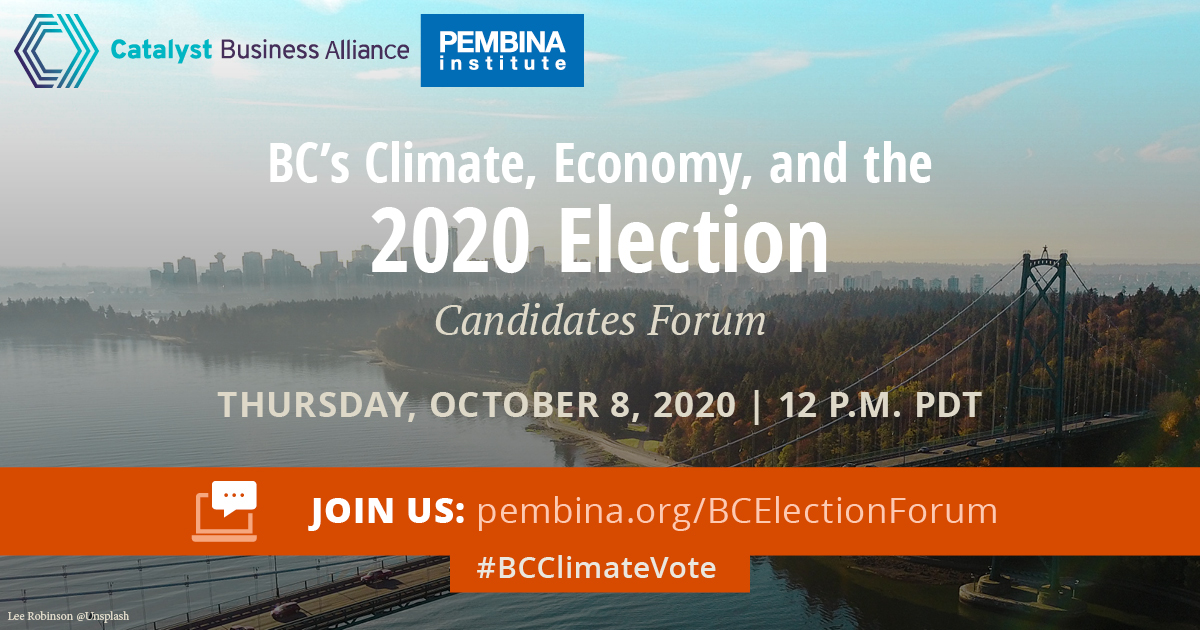VANCOUVER / MUSQUEAM, SQUAMISH & TSLEIL-WAUTUTH TERRITORIES — Karen Tam Wu, B.C. director at the Pembina Institute, made the following statement in response to today’s release of the B.C. NDP election platform:
“The pandemic has made it clear that our health, economy, and environment are intricately linked. So, it’s a positive sign that one pillar of the B.C. NDP platform is creating jobs in an inclusive, clean-energy economy. We welcome the party’s promise to follow through on the CleanBC climate plan and take additional actions. We hope all parties will commit to legislating a target of net-zero emissions for 2050 to align B.C.’s ambition with that of Canada and companies around the world.
“While the platform is light on climate-action details, it makes important commitments that could result in lower-carbon homes and buildings — namely, allowing local governments to set limits on carbon pollution for new buildings, and accelerating retrofits through incentives, property assessed clean energy (PACE) financing, and energy-efficiency labels for homes listed for sale. The platform also recognizes the importance of shifting industrial vehicles and buses from fossil fuels to zero-emissions energy sources. As the economy recovers, we’re hoping to see greater investment in training workers for the jobs of the clean-energy future.
“We want B.C.’s industries to remain competitive in the decarbonizing global marketplace. We acknowledge the NDP’s commitment to reducing carbon pollution from industry through electrification and other initiatives. Better methane detection is welcome, but we also need to set higher targets for reducing methane emissions from the natural-gas sector. There is no wiggle room in B.C.’s carbon budget for any new projects, such as new liquefied natural gas plants, that increase B.C.’s carbon pollution.
“B.C.’s next government will need to get us on track to our climate goals with an enhanced climate plan. We’re also looking for the next government to reinstate the carbon tax schedule of increases and commit to future increases. Moving forward, comprehensive annual reporting is needed for British Columbians to assess our success at bringing carbon pollution down and course correct as needed. We simply can’t afford to keep missing targets for reducing carbon pollution. All parties must put forward a robust plan to achieve B.C.’s 2030 climate target to have any hope of flattening the carbon-pollution curve by 2050 and positioning B.C. for a stable economic future in the face of global disruptions.”
Quick facts
- B.C.’s total carbon pollution in 2018: 67.9 million tonnes (Mt)
- Share of B.C.’s carbon pollution from transportation: 36.6%
- Share of B.C.’s carbon pollution from industry: 35.1%
- Share of B.C.’s carbon pollution from upstream natural gas operations (production and distribution): 17.6%
- Share of B.C.’s carbon pollution from buildings: 12.2%
- B.C.’s legislated target for carbon pollution in 2030: 36.5 Mt
[30]
Join the conversation on Twitter: #BCClimateVote @Pembina
Contact
Stephen Hui
Senior Communications Lead, Pembina Institute
778-987-7654
stephenh@pembina.org
Tw: @StephenHui
Background
Action plan: A resilient economy and safe climate: Our vision for B.C.
Candidates forum: B.C.’s Climate, Economy, and the 2020 Election
About the Pembina Institute
The Pembina Institute is a non-profit think-tank that advocates for strong, effective policies to support Canada’s clean energy transition. We have offices in Vancouver, Calgary, Edmonton, Toronto, and Ottawa. Learn more: www.pembina.org





